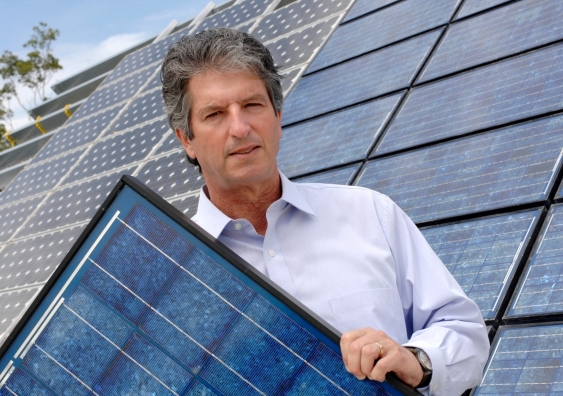‘Solar superman’ scoops Global Energy Prize
UNSW Scientia Professor Martin Green has become the first Australian to win the Global Energy Prize, beating Elon Musk to the prestigious $820,000 award.

Professor Green was honoured for having revolutionised the efficiency and costs of solar photovoltaics, making this the lowest cost option for bulk electricity supply.
Australia’s ‘father of photovoltaics’ – or ‘solar superman’ – requires little introduction. He is director of the Australian Centre for Advanced Photovoltaics at UNSW, and with his students has driven sharp reductions in costs of photovoltaic solar systems by establishing manufacturing centres in Asia.
The annual Global Energy Prize – which he will share with Russian scientist Sergey Alekseenko – honours outstanding achievements in research and technology that are addressing the world’s pressing energy challenges.
ARENA has been proud to fund some of Professor Martin Greens’ groundbreaking work, most recently awarding his University of New South Wales research unit $16.4 million when they took out 11 of the 20 successful projects in last year’s solar research funding round.
One of these projects is attempting to find a new form of adamantine compound that can be overlaid on top of silicon solar cells to create a more efficient cell. Professor Green is optimistic that the resulting “tandem cells” can break through the barrier of 25 per cent efficiency that limits most current cells.
Going back to 1989, Professor Greens’ team supplied the solar cells for the first photovoltaic system with an energy conversion efficiency of 20%. And in 2014, he headed the development team that first demonstrated the conversion of sunlight into electricity with an energy conversion efficiency of 40%.
Speaking at last year’s ARENA’s Innovating Energy Summit, Green told the audience that constructing one terrawatt of solar PV offers the best chance to keep global temperature rises below the 2 degrees pledged in the Paris climate accord.
Responding to the news that he had come out on top of the ten finalists – including Tesla founder Elon Musk – in the Global Energy Award, Professor Green said he was proud to receive the prize given the quality of candidates in the field.
“The efficiency of solar modules is an area whose progress has been faster than many experts expected, and this is good news.”
“We need to maintain the pace of research in Australia, not only to keep our international lead, but also to benefit society by providing a cheap, low carbon source of electricity,” he said.
Over his career Professor Green has received many scientific and industry awards. In 2003 he was awarded the Karl Boer Solar Energy Medal of Merit, and in 2004 he received the World Technology Award in the field of energy. He holds many patents and has authored eight books, as well as more than 750 publications.
Professor Green will be presented with the award in Russia in October.
LIKE THIS STORY? SIGN UP TO OUR FORTNIGHTLY NEWSLETTER

ARENA